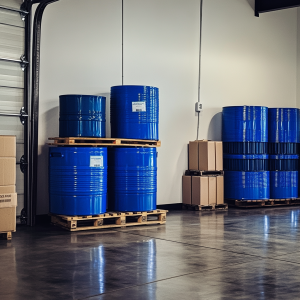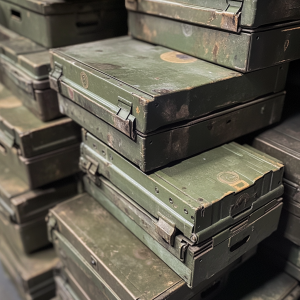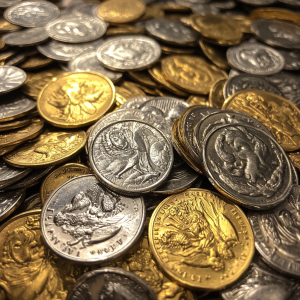
Store items up off of heated cement
Preparedness Mythbusters What? You mean Wikipedia and Snopes and the ramblings on Facebook could be wrong? *ahem* When times get tough, it’s no time to discover that you may have put stock in some nonsensical homespun tale. Preparedness Pro understands that acting upon correct information is just as important as preparedness efforts. So below, you will find some of the more common myths I’ve heard and I’ll be sure to add more as I encounter them.
Myth: Rotate your water storage every 6 months to 2 years.
Truth: Nonsense. Do you have any idea how long your tap water is stored before it gets to your faucet? Years, and usually in public exposure scenarios. Water is a universal solvent though–so more important than changing it out repeatedly is making sure you use uncompromised containers in the first place. Use strong, thick, food-grade materials. While there’s no need to change out the water more frequently than every 5 years or so, if at all, you do want to make sure that you inspect for leaking containers on a regular basis. Also, if you’re using tap water, then don’t bother treating it UNTIL you use the water. There’s more than enough chlorine and all kinds of other chemicals in that water until you’re ready to filter and use it.
Myth: To protect your small electronics from damage caused by an EMP or solar flares, simply wrap in thick foil and store in an old microwave or refrigerator.
Truth: What’s really crazy is when people say this about cell phones—which of course, if your area is exposed to an EMP or damaging solar flares would no doubt knock out the communication systems. Additional such assertions indicate a lack of understanding relative to the theories of radio and the theories of high-frequency, high-energy junction inhibition (EMP waves). They are not equal and synonymous. An EMP is at a much higher frequency than cellular communication and AM or FM radio. While foil may improve or interrupt your television reception it is not sufficient hardening material against the effects of an EMP or harmful solar flares. A well-crafted Faraday cage should be used to protect any electronics that you deem necessary and/or vital to your well-being. Or invest in the EMP Shield. (Save $50 with “PrepPro)
Myth: Don’t store bottled water on cement; it can leach chemicals into your water.

Mention PrepPro for $50 off your EMP Shield!
Truth: Heated cement can cause a chemical reaction, so don’t store any food or drink on cement that is exposed to the sun or on a portion of a slab that is exposed to the sun. But storing goods on the concrete in the cellar or basement is perfectly fine.
Myth: Add vital wheat gluten to your bread dough to make it rise and bake properly.
Truth: When you grind your own flour and use it shortly thereafter you do not need vital wheat gluten. It’s already present in your flour. However, old/stale flour will definitely require vital wheat gluten. Also, dough enhancer is a great addition to any bread dough. It typically contains vitamin C, a bit more yeast and a bit of dough enhancer. Yeast just loves sugar and vitamin C.
Myth: Use an oxygen absorber when storing dry goods, seeds, and grains.
Truth: Seeds and grains are alive. They need oxygen to thrive and definitely if you want to be able to sprout them later. So do not store them in oxygen deprived containers/environments.
Myth: I don’t have enough room to store a year’s supply of food.
Truth: If you have the space of a twin size bed for every member of your family then you have enough room for a year’s supply of quality food; the storage of which doesn’t require any more room than under a twin bed.
Myth: You will die if you go without water for more than 72 hours
Truth: This is slightly exaggerated and I’m only addressing it in an effort to clarify the relationship between water and our body functions. The aftermath of the disaster in Haiti revealed survivors who endured without food or drink for as much as 11 days. However, it is correct that if you go 72 hours without water, you WILL permanently damage vital organs in your body in some way or another. You don’t want to destroy any organs, do you? The impact of going so long without water will be determined by how hydrated your body is to begin with and what kind of activity you’re involved with over those 3 days. So the best way to approach “Water Preparedness” is to make sure everyday is a well hydrated day. Always have water on hand INSIDE your shelter and automobile (because a biochemical or nuclear problem will taint your outdoor water). And if you run into someone who’s not had water for 72 hours, don’t start digging a grave for them–get them hydrated. *grin* Also, keep in mind that drinks such as soda pop or Kool-aid actually require the body to use more water than what they would get from such a drink. Just plain water is the best hydration for the body. Once you add something else to it, your body will handle it differently. Hydration is not something you want to take for granted because once the damage has been done to a vital organ, no amount of water intake can correct that.

All calibers have value
Myth: Don’t bother storing anything less than 9 mm ammo. It’s useless for self-defense.
Truth: Successful self-defense and hunting has a lot more to do with shot placement and skill than the caliber of the ammunition.
Myth: There’s no need to bother with getting a HAM operator’s license (Amateur Radio) because by the time I have to use it, no one will care whether I have a license or not.
Truth: Such a position naively assumes that there is only one type of defining scenario which would require the use of a HAM radio. Preparedness and self-reliance is valuable everyday just as much as first-aid training is. And thus a HAM radio with proper skills, training, and licensing can indeed be an asset now.
Myth: “When things go south, I’m going to YOUR house”. (or mom and dad’s, etc.) OR “when things go south, I’m going to grab my gun and find me a Mormon.”
Truth: This statement naively makes many faulty assumptions not the least of which being that such a “go south” scenario would not interrupt travel with plenty of fuel and obstacle-free roadway, that a person will be healthy enough to travel; that nothing will have happened to the supplies of the person you’re relying upon (i.e. an earthquake, tornado, flood, fire, etc.) and that the person whose supplies you’ve decided to help yourself to is not sufficiently protected against “unfriendly” types. Additionally, such an assumption of relying on someone else for your own safety and well-being is the antithesis of SELF-reliance.

It’s likely that even gold and silver could become worthless in a widespread crisis where food reigns supreme.
Myth: In the event of a financial collapse you’ll want to make sure you’ve stocked up on plenty of currency and pre-1965 coins.
Truth: Pre-1965 dime and quarter coins actually contain silver in them and thus they can come in handy amidst a world that no longer values paper currency. However, be sure that you exercise balance in this particular effort because it should not be done at the cost of compromising higher priorities of preparedness. At some point it’s very likely that even silver and gold currency will be useless if there is a scarcity of essentials to purchase such as food, water, shelter, clothing, etc. As they say “you can’t eat gold or silver.”



2 Comments
Troy · March 5, 2015 at 11:35 pm
I wish you had references for
I wish you had references for your great articles. I am not wishing to attack. But understanding that we live in a world of free information where many things that make sense often do not pan out as exactly truthful. It would be comforting to know where the info is coming from. Thank you
Happy Preppers · May 12, 2015 at 5:48 am
I read that plastic
I read that plastic containers are slightly permeable, which may allow ambient air gases such as vapors from household solvents, petroleum-based fuels and other chemicals, to affect the taste and odor of water.
Comments are closed.